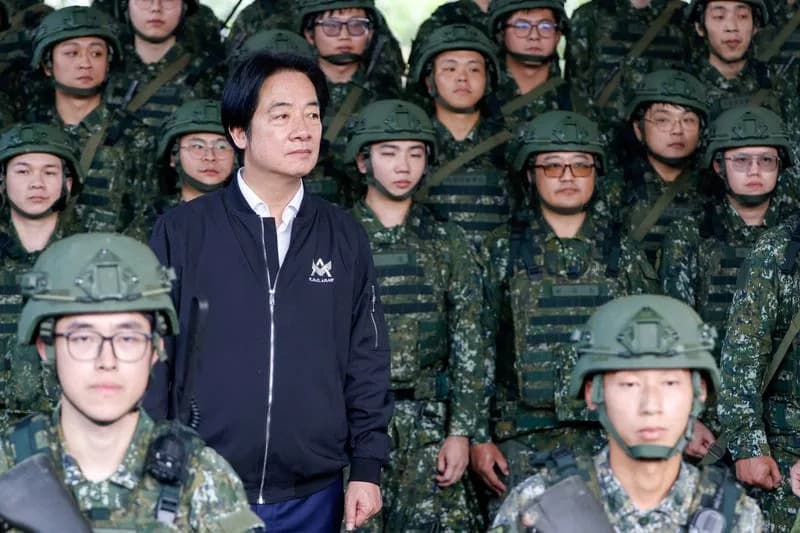Taiwan's President Lai Ching-te posted photos and a video of himself eating sushi to signal solidarity with Japan after reports that China may suspend Japanese seafood imports. The dispute followed remarks by Japan's new prime minister suggesting Tokyo might act militarily if Taiwan were attacked, angering Beijing. China has summoned Japan's ambassador, postponed some cultural releases and warned travelers; the U.S. and Taiwanese officials have publicly backed Tokyo. Diplomatic talks have started but have not yet eased tensions.
Taiwan President Holds Up Sushi to Show Solidarity with Japan Amid Rising Tensions with China

Taipei — Taiwanese President Lai Ching-te posted images and a short video on social media showing him holding a plate of sushi in an apparent gesture of support for Japan after reports that China may suspend imports of Japanese seafood.
The diplomatic spat was sparked this month when Japan's newly appointed prime minister, Sanae Takaichi, suggested Tokyo might intervene militarily if Taiwan were attacked. China regards democratic Taiwan as part of its territory and has repeatedly warned it may use force to bring the self-ruled island under Beijing's control.
Lai, a vocal defender of Taiwan's sovereignty who is frequently criticized by Chinese officials, accused Beijing of undermining regional peace as tensions escalated. He posted a smiling photograph of himself holding sushi on Facebook with the caption, "Today's lunch is sushi and miso soup," noting the yellowtail came from Kagoshima and the scallops from Hokkaido. He shared similar posts on X and Instagram, including a short clip recommending that followers "might be a good time to eat Japanese cuisine," and saying the gesture "fully shows the strong friendship between Taiwan and Japan."
China's foreign ministry dismissed Lai's posts as a "stunt." The social-media activity followed media reports in Tokyo that China would suspend Japanese seafood imports; neither Beijing nor Tokyo has formally confirmed such a ban.
Escalating diplomatic fallout
In recent days, China summoned Japan's ambassador and warned its citizens against travel to Japan following the controversy over Takaichi's comments. State media also reported that the release of at least two Japanese films in China would be postponed. Japan reported scrambling aircraft after detecting a suspected Chinese drone near Yonaguni, a southern island close to Taiwan.
At a regular briefing, Chinese foreign ministry spokeswoman Mao Ning urged Japan to "behave with dignity" and take "concrete actions," including retracting Takaichi's statement, to repair ties. "Simply asserting that its position (on Taiwan) remains unchanged does nothing to address China's concerns," she said.
U.S. Ambassador to Japan George Glass pledged Washington's support for Tokyo on social media, writing that "coercion is a hard habit to break for Beijing" and recalling U.S. backing for Japan during a previous Chinese ban on Japanese seafood. Japan's Chief Cabinet Secretary Minoru Kihara reiterated that Tokyo's official position on Taiwan remains "unchanged."
Taiwan's Foreign Minister Lin Chia-lung condemned what he described as the Chinese Communist Party's use of "economic coercion and military intimidation" and encouraged Taiwanese to travel to Japan and buy Japanese products to counteract pressure. Diplomatic efforts have begun — Japan sent a senior diplomat to Beijing for talks — but so far there has been no clear breakthrough to de-escalate the standoff.
Help us improve.




























